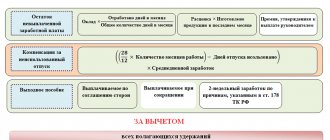18.08.2019
0
71
4 min.
In Russia, people with disabilities have the right to receive certain benefits. They also apply to parents when it comes to minors with physical disabilities. According to the law, citizens of the Russian Federation raising a child with disabilities can receive additional days off. This right is guaranteed by Article 262 of the Labor Code of the Russian Federation.
Features of providing additional days off
First of all, it should be noted that Article 262 of the Labor Code applies only to citizens working officially under a contract. When hiring under GPA or other forms of contracts, the employer is not required to provide benefits. If a person is employed externally, the management of the enterprise should not pay for time off. In such cases, the employee is given additional days off at his own expense.
Required documents
You can confirm your right to benefits only if you have certificates and certificates. In other cases, the employer will deny the employee additional days off due to the lack of a supporting base. Requested documents include:
- A copy of the certificate confirming the status of “disabled child”;
- A document that confirms your actual place of residence;
- A copy of your birth (or adoption) certificate;
- Certificate from the place of employment of the second parent (stating that he did not receive days off or used them partially).
It is important to know! If only one person is involved in upbringing and care, he must provide documentary evidence. In this case, a certificate from the place of employment of the second parent is not required.
Duration of rest
The number of days off is clearly stated in Art. 262 of the Labor Code. Each month, parents can receive four additional days paid by the employer. If the above documents are available, the employer does not have the right to refuse to provide the employee with time off.
Base
Additional days off are given only at the parents' own request. Employees of this category are required to send a written application to the manager. It reflects a request for time off in connection with caring for a child with disabilities, indicating the dates. An employer cannot send an employee on weekends without his consent.
Payment calculation
Material compensation is determined based on the average salary. The calculations take into account the salary, some types of bonuses, allowances, and the number of overtime hours worked. The employer is reimbursed by the FSSS for the costs associated with paying for time off.
Procedure for provision
To receive additional days off, you need to submit an application to management. If necessary, the document can refer to Art. 262 TK. The employer is required to issue an order in accordance with which paid time off will be provided.
The time spent on weekends is entered into the employee’s time sheet and individual card. In the future, they affect the amount of vacation time. An employee does not have the right to request time off for the previous month or year if he has not previously used it. He also cannot ask for financial compensation for unused days off.
The right to choose days
Parents have the opportunity to choose the date of additional days off at their own discretion. In addition, if the employer refuses to provide the required time off, employees falling under the described category may leave the workplace. This will not be regarded as absenteeism, however, such a rule is only valid if a corresponding application has been submitted.
Working conditions (features of working hours)
When concluding an employment contract, at the request of an employee who has a disabled child under the age of 18, he may be assigned a part-time working day (shift) or a part-time working week (part one of Article 93 of the Labor Code of the Russian Federation, Article 264 of the Labor Code of the Russian Federation). In this case, it can be shortened (clause 8 of the Regulations, approved by the Decree of the State Committee for Labor of the USSR, the Secretariat of the All-Union Central Council of Trade Unions dated April 29, 1980 No. 111/8-51, hereinafter referred to as the Regulations):
– number of working hours (part-time or shift);
– number of working days per week (partial working week, for example from Monday to Thursday);
– number of hours per day and working days per week (combination of part-time working hours).
If a woman’s working day exceeds 4 hours, she must be given a break for rest and food (clause 9 of the Regulations).
Part-time work does not entail for employees any restrictions on the duration of annual basic paid leave, calculation of length of service and other labor rights.
Part-time working hours can be established for an employee raising a disabled child and when an employment contract has already been concluded with him. In this case, the employee must write a statement and indicate the required work schedule. After consideration of the application by the head of the organization, it is necessary to conclude an additional agreement to the employment contract with the employee and issue a corresponding order.
Sending on business trips, engaging in overtime work, night work, on weekends and non-working holidays is possible only with the written consent of an employee who has a disabled child (Article 259 of the Labor Code of the Russian Federation). In this case, the employee must be informed in writing of his right to refuse this type of work.
It is advisable to keep a log of employees for whom benefits and additional guarantees are provided. It must indicate the type of guarantees provided and the duration of the benefit (for example, the date the disability ends or the date the child reaches 18 years of age). This will facilitate the work of the personnel department when considering issues related to involving employees in overtime work, sending them on business trips, dismissal, etc.
The legislative framework
The norms of the Labor Code (Labor Code) of Russia, Government Decrees, laws and by-laws ensure the provision of the following preferences to families raising their own or warded disabled children:
| Name of the normative act | What benefits are provided? |
| TK, Art. 262 | On receiving additional days of rest for working parents |
| TK, art. 263 | The right to additional leave without pay |
| TK, Art. 93 | Ability to work less than 8 hours |
| Federal Law of November 24 1995 Art. thirty | Benefits of free travel on public transport |
| Decree of the President of Russia No. 551 | Possibility of receiving monthly compensation for care |
| Tax Code, Art. 218 | Reducing the tax base |
| Law of December 17, 2001 N 173-FZ, part 2 | About preferential pension |
| Federal Law No. 178, dated 07/17/1999 | The right to a free trip for a parent accompanying a child for treatment at a sanatorium (resort) |
| Federal Law No. 181, Article 17 | Getting the opportunity to improve your living conditions |
Parents of children with disabilities can receive benefits and guarantees until they reach adulthood. For further education of a disabled person of groups 1 and 2, parental preferences are valid until the child’s 24th birthday, but young people must study full-time.
Explanations of the Ministry of Labor
Considering Art. 262 of the Labor Code of the Russian Federation with comments from the Ministry, a number of nuances should be noted. First of all, these days are provided to one of the employed parents, trustees or guardians. To implement this opportunity, the subject of the law must fill out a sample application approved by Order of the Ministry of Labor No. 1055. According to Art. 262 Labor Code of the Russian Federation days are provided based on the order of the head of the enterprise. At the same time, as the Ministry of Labor explains, the person must submit a certificate from the social protection agency confirming that the child has a disability. This document must also indicate that the minor is not in a specialized institution on full state support. It should be noted that 5- and 6-day boarding houses do not belong to such institutions. The working parent/guardian/guardian must also provide a certificate from the spouse’s place of employment stating that, as of the date of application, paid days in the same month were not used (or partially used).
Special situations
To implement the provisions of Part 1 of Art. 262 of the Labor Code of the Russian Federation requires documentary evidence:
- Death of one of the subjects of law.
- Divorce.
- Deprivation of parental rights.
- Other cases of lack of care on the part of one of the adults (work trip for a long period of time, serving a sentence, etc.).
If the appropriate papers are available, a working person raising a disabled child is provided with an additional 4 days of rest without presenting a certificate from the other parent’s enterprise. A similar procedure applies to single mothers.
Common mistakes when interpreting concepts
Error 1. The difference between the categories “disabled child” and “disabled since childhood” should be correctly understood. Many citizens mistakenly identify and often confuse these two concepts.
A disabled child is a citizen who has not reached the age of majority, but has a disability according to the conclusion of the ITU. In this situation, the cause and time of establishment of disability are not of dominant importance. A person could receive this category at any time before turning 18. Depending on the predicted outcome, the validity of this category may be limited to 1–2 years. If the restoration of lost body functions is doubtful or impossible, then a disability of up to 18 years is established.
The category “disabled since childhood” has a completely different interpretation. It includes adult citizens whose functional impairment of health was expressed, recorded in childhood or before birth. Moreover, the named category was received by them before the onset of 18 years. When they turned 18, they confirmed it and received the appropriate disability group.
For your information, children with disabilities are not diagnosed with a disability until they grow up. When they turn 18, they can be assigned disability according to indications, but they are not disabled since childhood.
Payment
As the Ministry of Labor explains, when calculating compensation, the amount of average earnings is used. Payment for additional rest is financed from the Social Insurance Fund. Calculation of average earnings is carried out according to the rules established in federal legislation. Since 2010, financial support for the costs of paying for additional rest provided to care for a disabled child is made through transfers from the budget to the Social Insurance Fund. The calculation of average earnings is carried out according to the rules of Article 139 of the Code and the Regulations approved by Government Decree No. 922. The calculation is made by dividing the actual accrued salary by the number of days worked. In this case, remunerations and bonuses taken into account in accordance with clause 15 of the above Regulations are taken into account.
Labor benefits for parents with disabled children
When a family is raising a disabled child, benefits allow parents, without having to pay off work, to devote more time and care to a child with mental or physical disabilities. The right of guardians and parents to receive certain benefits is ensured by the Labor Code of Russia.
Work regulations for guardians and parents of children with disabilities
The legal norms of labor legislation provide for the following preferences for working parents whose family has disabled children:
- The mother’s right to legally not work at night, overtime or on holidays (weekends). If the employee agrees, such a change in the work schedule is permitted;
- At the request of parents or guardians from this category, the employer must assign them an incomplete week, shift or working day.
It is prohibited by law to refuse employment to a woman who has a disabled child, as well as to reduce the salary of such an employee.
Leave benefits for working guardians (parents)
Labor legislation provides the opportunity for parents (guardians) of disabled children to receive additional days off from work:
- The right to two weeks' leave without pay is granted to them at any time when required. Vacation must be used in the current year, transfer of use is not allowed (Article 263 of the Labor Code);
- Providing paid leave for 4 working days every month. The basis is the petition of the guardian (parent) to the employer with the addition of a certificate from the local social security authority. The benefit is received by one of the guardians or parents, or each - but for two days.
Parents (guardians) of people with disabilities since childhood will receive their earnings according to the time worked.
Rights of guardians and parents provided by pension legislation
One of the government support measures for families raising children with disabilities is providing parents with the opportunity to retire early in old age.
Hiring disabled people
The procedure for hiring a disabled person is not much different from the procedure for hiring a regular employee.
Before formalizing an employment relationship, a person entering work, in accordance with Art. 65 of the Labor Code of the Russian Federation must present the following documents to the employer:
passport or other identity document;
a document on education, qualifications or special knowledge - when applying for a job that requires special knowledge or special training;
work book, with the exception of cases when an employment contract is concluded for the first time or the employee starts working on a part-time basis;
insurance certificate of state pension insurance;
military registration documents - for those liable for military service and persons subject to conscription for military service;









